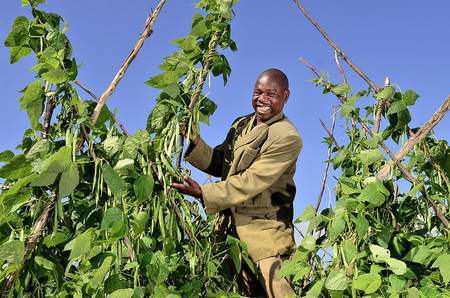-
About
- Our Work
- Get Involved
- Stay Updated
Firefighter, teacher, pilot farmer?
 Arguably the most heated topic of discussion in the schoolyards growing up in my home country of Nigeria was, What are you going to be when you grow up: a teacher? Or a farmer?
Arguably the most heated topic of discussion in the schoolyards growing up in my home country of Nigeria was, What are you going to be when you grow up: a teacher? Or a farmer?As far as I remember, the number of guys wanting to be a teacher always far outweighed those wanting to be a farmer and that number included myself. My guess is that, at that age, teaching was simply a more identifiable career for us. Teaching seemed easier. More lucrative. Closer to home. The aspiring farmers always had trouble convincing the others of the attractions of an agricutural career.
 For many young pupils, its simply impossible for them to imagine themselves as farmers. But they can relate to the teaching profession and would choose it over farming any day. This reaction occurs despite the fact that teaching was (and still is) one of the least paid professions for which you are required to have an education in Nigeria.
For many young pupils, its simply impossible for them to imagine themselves as farmers. But they can relate to the teaching profession and would choose it over farming any day. This reaction occurs despite the fact that teaching was (and still is) one of the least paid professions for which you are required to have an education in Nigeria.So I was pleasantly surprised when Mr. Julius Atia, the Communications & Information Officer of International Centre for Research in Agroforestry (ICRAF), told me today the story of Christophe Misse, a former teacher in Cameroon who became a farmer because his monthly salary of $29 could no longer sustain his family. I interviewed Mr. Atia while he was tending to the ICRAF booth at the 6th Africa Agriculture Science Week (AASW) organized by FARA in Accra, Ghana.
According to Mr. Atia, after Christophe switched over to planting high value traditional fruit trees for a living, his income jumped to over $10,000 per annum, and that was just from selling his nursery plants! With this money, not only was he able to sustain his family but he was also able to put his three children in boarding school.
Christophes story is just one among many in the different countries of Africa where ICRAF does its work.
What could more stories like this do to convince young Africans that there could be a better life out there on the farm, away from jobs that provide them with cool offices but put little money in their pockets? Could they even attract the unemployed ones among them and they are in the tens of millions to come invest their energy, drive and creative ideas into agriculture?
By widely sharing stories that make agriculture more appealing to youth, we might just succeed in killing many birds with one stone: reducing unemployment among youth, improving food security and rolling back the scourge of hunger and malnutrition in Africa.
Whats more, we can ensure that the FARA AASW6 theme Africa feeding Africa goes beyond just words, and is translated to actions.
Source: Original blogpost by Bunmi Ajilore, a social media reporter for AASW6 on the FARA-AASW blog.
Photo: N. Palmer (CIAT)
About the author
Related Posts
Comments
No comments made yet. Be the first to submit a commentBy accepting you will be accessing a service provided by a third-party external to https://ypard.net/
Get in touch
Email: [email protected]
YPARD Global Coordination UnitHosted by AGRIDEA and the Czech University of Life Sciences Prague
Lausanne, Switzerland and Prague, Czech Republic - Our Work

